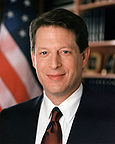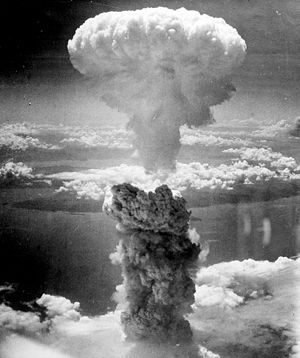- Portal:Environment
-
- Wikipedia portals:
- Culture
- Geography
- Health
- History
- Mathematics
- Natural sciences
- People
- Philosophy
- Religion
- Society
- Technology
 Politics: Anarchism · Communism · Conservatism · Fascism · Liberalism · Libertarianism · Political science · Socialism
Politics: Anarchism · Communism · Conservatism · Fascism · Liberalism · Libertarianism · Political science · SocialismThe Environment Portal
The natural environment comprises all naturally occurring surroundings and conditions in which living things grow and interact on Earth. These include complete landscape units that function as natural systems without major human intervention, as well as plants, animals, rocks, and natural phenomena occurring within their boundaries. They also include non-local or universal natural resources that lack clear-cut boundaries, such as air, water and climate.The concept of the natural environment can be distinguished by components:
- Complete ecological units that function as natural systems without massive human intervention, including all vegetation, animals, microorganisms, soil, rocks, atmosphere and natural phenomena that occur within their boundaries.
- Universal natural resources and physical phenomena that lack clear-cut boundaries, such as air, water, and climate, as well as energy, radiation, electric charge, and magnetism, not originating from human activity.
As human population numbers increase and as humans continue to evolve, human activity modifies the natural environment at a rapidly increasing rate, producing what is referred to as the built environment. The potential of the natural environment to sustain these anthropogenic changes while continuing to function as an ecosystem is an issue of major worldwide concern. Key environmental areas of interest include climate change, water supply and waste water, air pollution, waste management and hazardous waste, and land use issues such as deforestation, desertification, and urban sprawl.
More about the environment... Selected article
Food waste in the United Kingdom has been identified as a considerable problem and has been the subject of ongoing media attention, intensifying with the launch of the "Love Food, Hate Waste" campaign in 2007. A significant proportion of food waste is produced by the domestic household, which, in 2007, created 6,700,000 tonnes of food waste. Potatoes, bread slices and apples are respectively the most wasted foods by quantity, while salads are thrown away in the greatest proportion. A majority of wasted food is avoidable,[d] with the rest being divided almost equally by foods which are unavoidable (e.g. tea bags) and unavoidable due to preference (e.g. bread crusts) or cooking type (e.g. potato skins).Reducing the amount of food waste has been deemed critical if the UK is to meet international targets on climate change, limiting greenhouse gas emissions, and meet obligations under the European Landfill Directive to reduce biodegradable waste going to landfill. Equally great emphasis has been placed on the reduction of food waste, across all developed countries, as a means of ending the global food crisis that leaves millions worldwide starving and impoverished. In the context of the 2007–2008 world food price crisis, food waste was discussed at the 34th G8 summit in Hokkaidō, Japan. UK prime minister Gordon Brown said of the issue "We must do more to deal with unnecessary demand, such as by all of us doing more to cut our food waste". In June 2009, then Environment Secretary Hilary Benn announced the government's "War on waste", a programme aimed at reducing Britain's food waste.
Did you know...
- ...that in United Nations Intergovernmental Panel on Climate Change fourth assessment report, average Arctic temperatures increased at almost twice the global average rate in the past 100 years?
- ... that the recycling symbol is based on the Möbius strip?
- ... that the concept of reduce, re-use, and recycle as three equal options, but they are instead meant to be a hierarchy, in order of importance?
- ...that the United Nations Environment Programme (or UNEP), which coordinates United Nations environmental activities, was founded in 1972?
Current events
- October 27, 2011 – Reinventing Fire: Bold Business Solutions for the New Energy Era, a book by Amory B. Lovins, analyzes the possibility of converting the United States to almost total reliance on renewable energy sources. (NYT)
- September 29, 2011 – Renewable energy in the UK hits record high reaching 9.6% of electricity production. (The Guardian)
- September 29, 2011 – The Belo Monte Dam project in Brazil halted after ruling that it risked damaging fish stocks. (The Guardian)
- May 30, 2011 -- In 2010 the energy-related CO2 emissions were highest in the history 30.6 Gt. According to IEA, the global energy CO2 -emissions should be equal or less than 32 Gt in 2020 to fulfil the agreed 450 Scenario. (IEA)
- April 10, 2011 -- The Japan Atomic Energy Agency raises the severity of the Fukushima I nuclear accidents to level 7, the highest on the International Nuclear Event Scale.
- March 16, 2011 -- Explosions and a fire at Japan's Fukushima Nuclear Power Plant have resulted in dangerous levels of radiation, sparking a stock market collapse and panic-buying in supermarkets. (SBS)
- March 11, 2011 -- Communities around the Pacific ocean, from Hawaii to Easter Island, scramble to safety after the Japanese Sendai earthquake and tsunami. (Guardian)
- March 8, 2011 -- First foundations are laid for the London Array, a planned 1,000 megawatt offshore wind farm under construction in the Thames Estuary in the UK. (Kent Online)
Selected biography
Albert Arnold "Al" Gore, Jr. (born March 31, 1948) is an American politician, businessman, and environmentalist. Gore served in the United States House of Representatives (1977–85) and the United States Senate (1985–93) representing Tennessee. From 1993 to 2001, he was the forty-fifth Vice President of the United States, under Bill Clinton. Gore starred in the 2006 documentary An Inconvenient Truth. Together with Intergovernmental Panel on Climate Change, Gore is a recipient of Nobel Peace Prize in 2007.Selected picture
The detonation of nuclear weapons leads to the release of radioactive material into the environment. This radioactive material affects human health and the natural environment.
Selected organization
The Brundtland Commission, formally the World Commission on Environment and Development (WCED), known by the name of its Chair Gro Harlem Brundtland, was convened by the United Nations in 1983. The commission was created to address growing concern "about the accelerating deterioration of the human environment and natural resources and the consequences of that deterioration for economic and social development." In establishing the commission, the UN General Assembly recognized that environmental problems were global in nature and determined that it was in the common interest of all nations to establish policies for sustainable development.
The Report of the Brundtland Commission, Our Common Future, was published in 1987. It was welcomed by the General Assembly in its resolution 42/187. The report deals with sustainable development and the change of politics needed for achieving that. The definition of this term in the report is quite well known and often cited:
- "Sustainable development is development that meets the needs of the present without compromising the ability of future generations to meet their own needs. It contains within it two key concepts:
- the concept of 'needs', in particular the essential needs of the world's poor, to which overriding priority should be given; and
- the idea of limitations imposed by the state of technology and social organization on the environment's ability to meet present and future needs."
Selected quote
Related categories
Environment Environmentalism • Environmental Science • Environmental social science • Environment by country • Environmental law • Environmental economics • Conservation • Waste management • Environmental books • Environmental films • Environmental history • Environmental songs • Sustainability • Pollution • Environmental sayings • Environmental awareness days • Environmental technology • Renewable energy • Lists of environmental topics 
Main topics
Things you can do
- Attention: Environment pages
- Cleanup: Bioeconomics, Biofuel, DDT (see Talk:DDT), Environmentalism, Tributyltin
- Expand: International development, Low-carbon economy, Sustainable development
- Expert attention: Biodegradable plastic, International development
- Merge:
- Neutrality: Energy economics, Sustainability
- Requests: Migration studies, Vertical kiln
- Sources: Appropriate technology, Biodegradable plastic, Energy development, Green politics, Recycling, Sustainable agriculture
- Spam cleanup: Sustainability, Sustainable development
- Stubs: Community-led total sanitation, Environment, Environmental organizations, International development, Renewable energy, Sustainability, Waste, Water supply, More...
- Wikify:
- Worldwide view: Recycling
Associated Wikimedia
Related portals
WikiProjects
Categories:- Environment portal
- Environment
- Science portals
Wikimedia Foundation. 2010.








